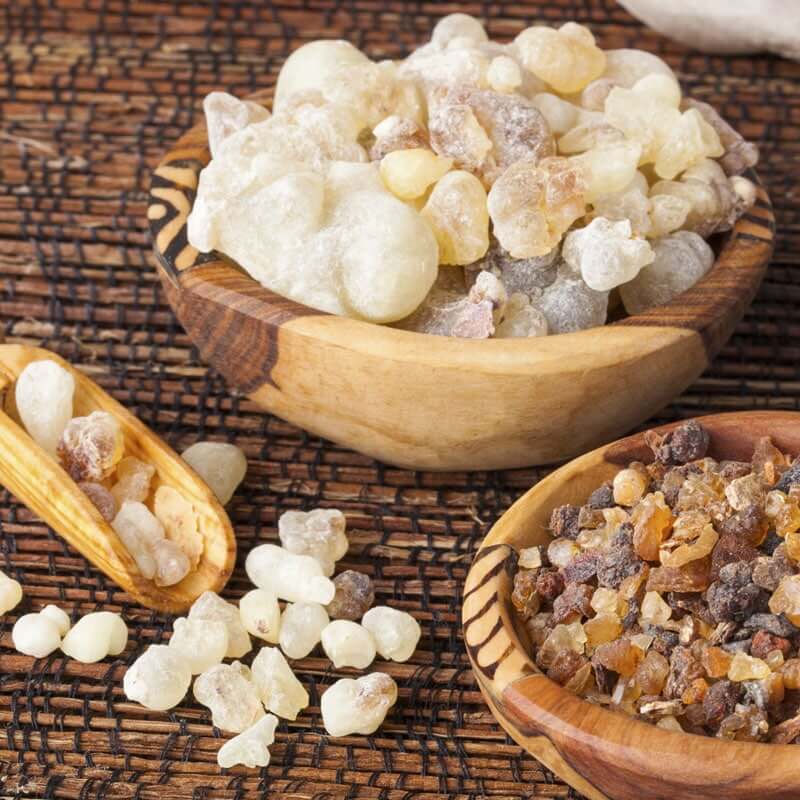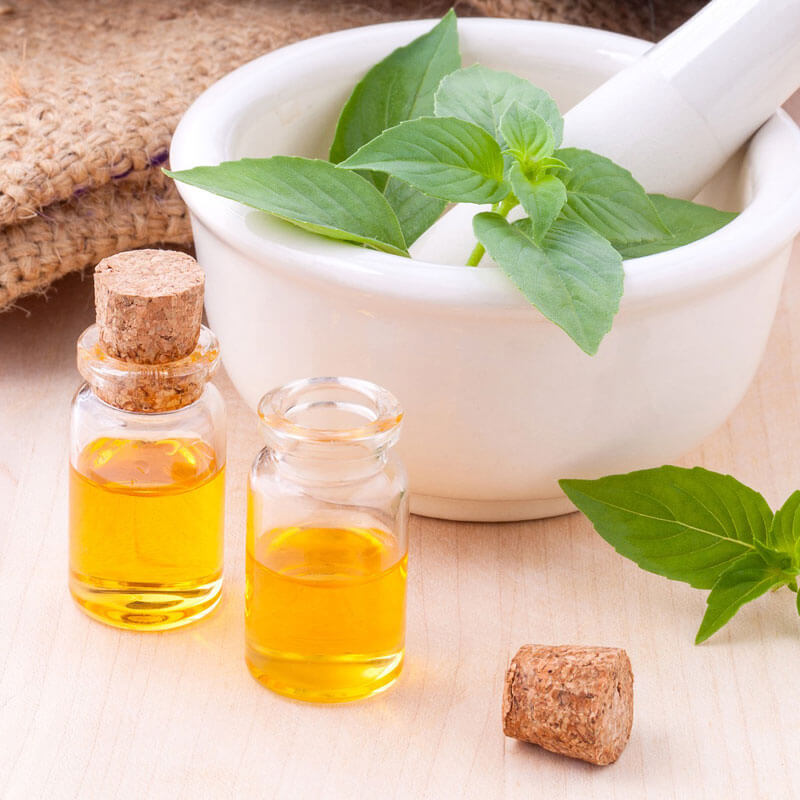Frankincense essential oil benefits are so profound that it’s not only known as the “King of Oils”, it is one the most popular natural remedies on the market today. And for good reason! It’s anti-inflammatory and anti-cancer power has been on the radar of researchers around the globe for several years now, and science is starting to catch up to traditional folk medicine regarding frankincense essential oil benefits!
Table of Contents
How was Frankincense Used in History?
Interestingly, frankincense has always been in high demand and history tells us many fascinating things about how ancient cultures used it.
Tradition tells us that, in Babylon, nearly 60,000 pounds of frankincense resin burned annually for its aromatics and its role in rituals. Later, we see the Magi bringing frankincense along with gold and myrrh to the infant Jesus. More than a costly, fragrant gift, frankincense essential oil benefits are well documented and have made this tree resin famous today.
Ayurvedic medicine, in practice for centuries, uses frankincense (referred to as “dhoop” and it use as “dhoopan”) for wound healing, female hormonal issues, arthritis, and air purification. In many cultures – including Somali, Ethiopian, Arabian, and Indian – frankincense essential oil benefits have daily uses. Burning it in the house is said to bring good health, and burning it in the evening is meant to purify the home and the residents’ clothing.
The Properties of Frankincense Essential Oil
Frankincense (Boswellia carterii, Boswellia serrata, and the other Boswellia species), as with all plants and their essential oils, carries many different molecules with different purposes. Some stand out as prominent in certain substances, as is the case with boswellic acids (BAs) in frankincense.
However, ask any chemist and they will tell you that BAs are too large to pass the steam distillation process. Oddly enough, there are still bad essential oil studies that claim (2) they are indeed part of frankincense oil. Subsequently, the jury is still out as to the exact mechanism(s) explaining why frankincense essential oil is so beneficial to cancer patients.
Nonetheless, the healing benefits of frankincense resin has traditionally centered on disease prevention and anti-inflammatory properties, and researchers have been able to confirm (3) in vitro that boswellic acids contain a potent ability to modify the immune system as well. Part of having a more efficient immune system is the regulation of inflammation, as well, which can have effects topically or systemically.
This is why it’s important to supplement with Boswellia resins. Formulated by my friend Sunil Pai, MD Integrative Medicine expert and medical director of Sanjevani Integrative Medicine Health & Lifestyle Center, Bosmeric-SR™ is the strongest natural supplement for pain and inflammation support. Here are the specs:
- Clinically tested, this unique sustained release formulation of patented ingredients delivers superior absorption and release over an 8 hour period.
- Each bi-layered caplet delivers the highest dosages available of Curcumin C3 Complex® (curcumin longa) [250 mg]; Boswellin® PS (Polysal) – 35% boswellic acids + 10% AKBBA + 35% Polysal™ (boswellia serrata); and Ginger Extract (zingiber officinale) 20% Gingerols. In addition BioPerine® (piper nigrum) is added to further enhance bio-availability.
- These ingredients support inflammatory physiological response mechanisms which are critical to the health of the entire body and have been shown to play a crucial role in supporting cardiovascular, immune, neurological, gastrointestinal, joint and connective tissue systems.
- Research now suggest that most, if not all disease, begins with inflammation.
Check it out for yourself HERE!
At this point, I’m sure you’ve heard of the so-called “frankincense cancer cure” that has gone viral the past few years. Why? Because several studies claim (4) that frankincense essential oil benefits have demonstrated anti-cancer properties and the ability to mitigate many different kinds of cancer cells. As more studies are conducted, the implications of this ability will be exciting to watch unfold!
The jury is still out as to the exact mechanism(s) explaining why frankincense essential oil benefits are so helpful to cancer patients. However, advances in recent research suggest that Beta-elemene – a cancer fighting terpene found in frankincense and myrrh with the ability to cross the blood brain barrier – may be partly responsible.
As stated (5) by the Memorial Sloan Kettering Cancer Center,
“Beta-elemene is a compound found in plants such as celery, mint, and in many others used in traditional medicine. Although the pure form is not used as dietary supplement, some cancer patients use herbs high in beta-elemene as treatment. Beta-elemene was shown to prevent growth of cancer cells in laboratory cells by different mechanisms. A few poorly designed studies done in humans showed that it may improve quality of life in cancer patients. It is unclear if raw herbs containing beta-elemene have the same effects in humans. More research is needed.”
Some even suggest (6) that the amount of β-elemene that frankincense and myrrh contain could very well explain why so many people claim that both oils have been instrumental to them beating cancer God’s way.
At the end of the day, once we know the basic properties of an herb, root and resin we are able to determine the best ways to utilize it. Let’s take a closer look at what the components of frankincense essential oil benefits mean for our daily lives…
1. Boosting the Immune System
According to the medical literature, the anti-inflammatory properties of frankincense is the primary method that the essential oil can help bolster immune function. (source) The immune system is intricate and amazing, interacting with every system of the body to prevent and fight disease. One of the primary mechanisms of the immune system is the influx of white blood cells, or lymphocytes, the main defense method that the body has. Inflammation is another component of the immune system, but in an unhealthy body, it goes overboard and becomes problematic.
As mentioned above, because it contains boswellic acids, frankincense extract contains more prominent and specific immune-modulating properties. (source) Phytotherapy Research, for example, published a study specifying that when mice ingested large doses of BA’s these immune-modulating results were uncovered: (7)
- Cytokine production
- Slowed hypersensitivity
- Increased immunoglobins
- Improved T-cell interactions
Because the chemical constituency of the oil differs from the extract, we cannot assume that the same benefits are transferable to the oil, but it’s promising research nonetheless.
2. Fighting Pain and Inflammation
The beauty of immunomodulators is that they can stimulate an under-productive immune system that allows illness to creep in, while also relaxing an over-productive immune system that attacks itself or benign substances with inflammation, often becoming painful, chronic, and debilitating.
By regulating inflammation, frankincense oil is a powerful tool not only for acute illness but for chronic and autoimmune disorders such as Crohn’s disease, rheumatoid arthritis, ulcerative colitis, and bronchial asthma. Weight and other metabolic issues are tied to inflammation as well, so even when these chronic conditions are not an issue, inflammatory illness is still a concern to monitor and prevent.
While inflammatory conditions are often painful, frankincense essential oil benefits can help with other pain relief as well. In Omani culture, it is traditionally used for pain in muscles, intestinal discomfort, and arthritic pain.
In 2014, researchers local to Oman tested frankincense essential oil and extracts to validate this practice compared with aspirin. Of the various preparations tested, frankincense oil showed the strongest pain inhibiting results with over 50% in both early and late phase pain. Researchers concluded (8) that,
“The present study provided the scientific justification about the analgesic properties of the essential oils, extract, and various sub-fractions obtained from the resin of B. sacra, thus validating its use in traditional folk medicines and other products; and hence supporting the development in the analgesic properties of bioactive natural substances.”
3. Preventing & Treating Cancer
While we do know that the various forms of frankincense (essential oils, extracts, pure resin, etc.) have the potential to fight cancer, much is left to be understood, making this a controversial topic in the natural health and research world.
Studies (9) continue to emerge, however, demonstrating the anti-cancer effects (10) on bladder, breast (11), and skin (12) cancers. For example, a recent research article was published that addressed frankincense oil benefits for people suffering from melanoma, a deadly form of malignancy. (source) Due to the tendency of melanoma drug treatments to be associated with liver injuries, the researchers evaluated how high doses of frankincense impacted animals with acetaminophen-induced liver damage, and discovered that it not only “significantly reduced the tumor burden related to the melanoma,” but frankincense essential oil helped reverse the liver damage that the animals developed.
For those who have added frankincense to their cancer care plan, the benefits may go beyond anti-tumor effects. Conventional treatment is often still required, but can be more painful and difficult than the symptoms of cancer itself. Brain cancer patients, for example, sometimes experience swelling in the head called cerebral edema after their tumors have been removed. Steroid treatment is common but also associated with difficult side effects and complications.
Frankincense on the other hand, has shown remarkable effects against this particular problem. In 2011, a clinical trial evaluating 44 individuals monitored frankincense as a remedy for cerebral edema. In 60% of the patients, the swelling was reduced by 75% or more. The concluding remarks (13) called for frankincense to be prescribed for cerebral edema in these circumstances, avoiding the struggles of steroid therapy.
For a similar call for a shift in treatment protocol, much more research must be done. Unfortunately, because cancer is such a deadly disease with a limited opportunity to administer effective treatments, testing the efficacy of alternative treatments, administering control studies, and adjusting administration and dosage all pose ethical roadblocks. So while specific answers may come slowly, it’s plain to see that the potential and properties exist. With little to no side effects associated with frankincense essential oil benefits, we have little to lose and much to gain when adding it to our daily routines or pairing it with cancer protocols. The resin, extracts, and even the essential il should all be considered as options to work in conjunction with an oncological approach.
Recommendations: In spite of the “frankincense oil cancer cure” controversy, the powerful role that frankincense essential oil benefits play in immunity, inflammatory control, pain relief, and anti-cancer potential makes it a necessary supplement to have around the house “just in case.” Vaporizors, salves, supplementation and diffusion are all beneficial ways to use it.
Some effective personal uses are to:
- Mix 10 drops of frankincense per 1 tablespoon of carrier oil of your choice, and apply over the tumor directly.
- Take 1 drop of frankincense with 1/2 teaspoon honey, maple syrup, or coconut oil.
- Put 3 drops into a gel capsule filled with olive oil and take with food.
- http://www.ncbi.nlm.nih.gov/pmc/articles/PMC3538159/
- http://www.ncbi.nlm.nih.gov/pmc/articles/pmc1112084/
- http://www.ncbi.nlm.nih.gov/pubmed/?term=frankincense+essential+oil+cancer
- https://www.mskcc.org/cancer-care/integrative-medicine/herbs/beta-elemene
- http://www.ncbi.nlm.nih.gov/pmc/articles/PMC3796379/
- http://www.ncbi.nlm.nih.gov/pubmed/18167047
- http://www.ncbi.nlm.nih.gov/pubmed/25312172
- http://www.biomedcentral.com/1472-6882/9/6
- http://www.ncbi.nlm.nih.gov/pubmed/22171782
- https://www.ncbi.nlm.nih.gov/pmc/articles/PMC5783593/
- https://www.researchgate.net/publication/274338503_Management_of_basal_cell_carcinoma_of_the_skin_using_frankincense_Boswellia_sacra_essential_oil_A_case_report
- http://www.ncbi.nlm.nih.gov/pubmed/21287538







